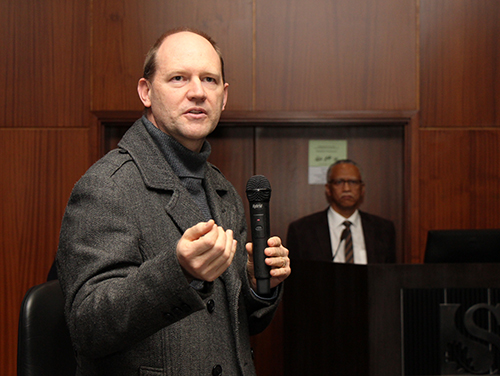In keeping with the vision of Stellenbosch University's Faculty of Medicine and Health Sciences (FMHS) to advance health and equality, the Tygerberg Campus has been declared a smoke- and tobacco-free campus.
This means that from 1 January 2019, no smoking or the use of any tobacco product (including e-cigarettes or hookah pipes) will be allowed anywhere on campus.
The FMHS will provide nicotine-replacement therapy and other proven interventions to help smokers quit or manage their cravings during their time on campus.
“In our strategic plan, the Faculty commits itself to the health and wellness of its staff and students. By making the campus a smoke- and tobacco-free space, we are creating a healthy and safe environment for everyone," Prof Jimmy Volmink, FMHS Dean, said at a public consultation session where the new regulations was announced.
 “The use of and exposure to tobacco is a public health concern," said Prof Nico Gey van Pittius, Vice-Dean: Research and member of the FHMS Tobacco-Free Campus Committee. “Tobacco doesn't only affect smokers, it also harms non-smokers and the environment. It is a risk factor for six of the eight leading causes of death, including various types of cancer, heart disease, respiratory infections and strokes. It increases medical costs, decreases productivity, and on average smokers die 10 years earlier than non-smokers," Gey van Pittius warned.
“The use of and exposure to tobacco is a public health concern," said Prof Nico Gey van Pittius, Vice-Dean: Research and member of the FHMS Tobacco-Free Campus Committee. “Tobacco doesn't only affect smokers, it also harms non-smokers and the environment. It is a risk factor for six of the eight leading causes of death, including various types of cancer, heart disease, respiratory infections and strokes. It increases medical costs, decreases productivity, and on average smokers die 10 years earlier than non-smokers," Gey van Pittius warned.
Although the FMHS will be the first entirely smoke- and tobacco-free campus in South Africa, this has been a growing trend internationally, and there are currently more than 2 000 smoke-free campuses (of which 1 743 are fully tobacco-free) in the USA alone.
These new regulations apply to all tobacco products, including cigarettes, electronic delivery systems (used for vaping), water pipes (colloquially known as hookahs or hubbly bubblies) and smokeless tobacco products such as chewing tobacco and snuff. The use of these products are prohibited on the entire campus, including all buildings, outdoor areas, residences and vehicles parked on the property. Signage information about the regulations will be widely displayed at entrances and other strategic areas on campus, and all staff members, students and visitors to the Tygerberg Campus will be expected to comply with the regulations.
“The Faculty opted not to allocate any designated smoking areas on the campus grounds. Research shows that allowing people to smoke in certain areas undermines tobacco-free policies, and campuses with full smoke-free policies have reported fewer problems with compliance than those with designated smoking areas," said Gey van Pittius. He added that the Faculty will allocate the money it would have spent on the construction of smoking shelters to assist staff members and students who want to quit smoking.
“We acknowledge that smoking and tobacco use is addictive and that users might find it difficult to stop. Therefore, it is important that individuals have access to support to help them comply with the regulations," said Gey van Pittius. The Faculty will provide smoking cessation support, including medication and nicotine-replacement therapy, materials and counselling through Campus Health Services to staff members or students who would like to quit smoking, or need help controlling their cravings.
Gey van Pittius stressed that the focus of the new regulations is on educating rather than punishing smokers. “Health and wellbeing are at the core of what we do and who we are as a faculty of medicine and health sciences. By making the Tygerberg campus a smoke- and tobacco-free campus we are being and becoming the change agents in society and are standing for what we believe is right."
Caption: Prof Nico Gey van Pittius explains the new smoke- and tobacco-free campus regulations at a public consultation session while Prof Jimmy Volmink looks on.

